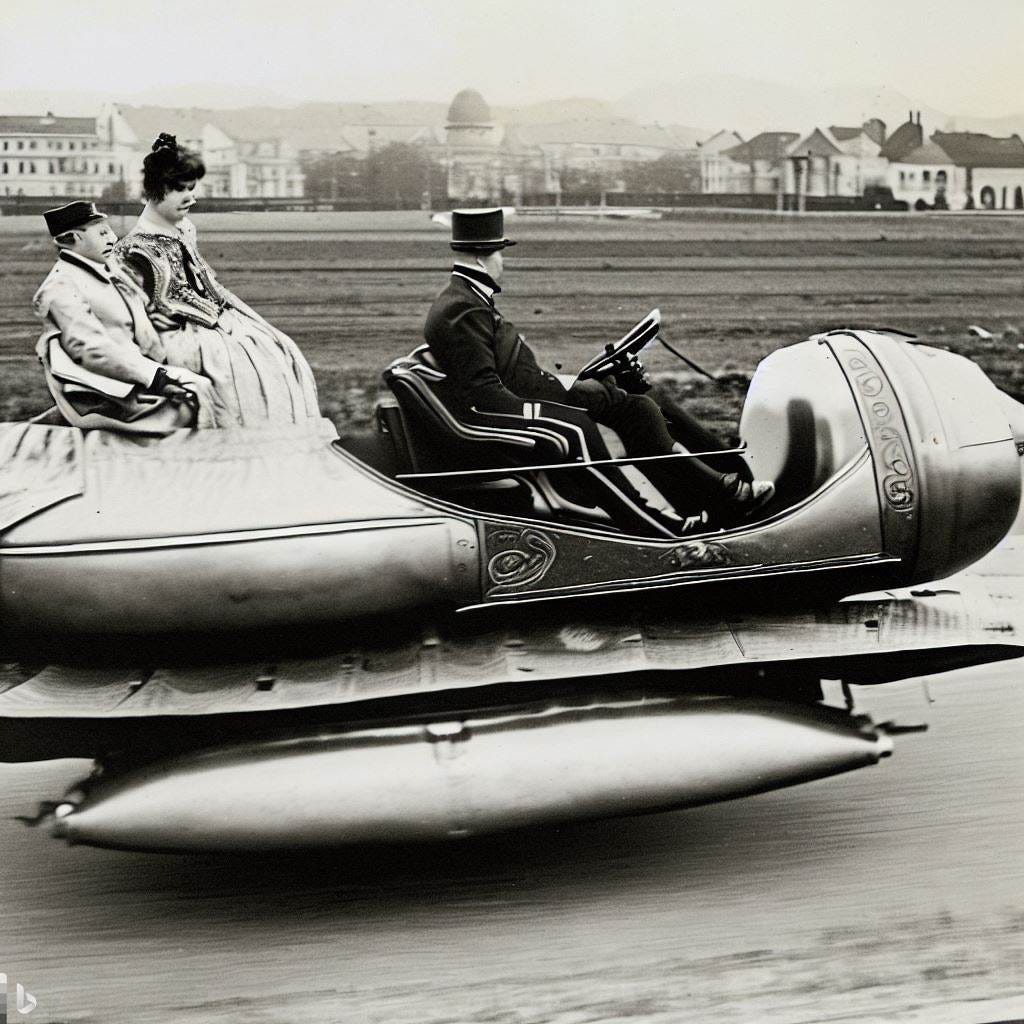The Railgun That Changed the World
“Bonjour papa,” little Ebenezer said as his father walked into the kitchen.
“Still speaking French then?” Winston teased as he grabbed orange juice from the icebox.
“We’ve only been back a day,” his wife, Anna, responded. “I’m sure he’ll forget it soon.”
“And I’m still craving those baguettes,” Winston smiled as he pulled her into an embrace.
“Calm down, world traveler. We don’t want Ebenezer getting too used to France, lest he adopt their ways.”
“The world is shrinking my dear. If the train gets you to Paris for supper and back home that night, nationalities may cease to exist.”
“Oh, stop,” she hit him lightly on the shoulder. “Your anarchist friends are filling you with that nonsense. What kind of culture would that be?”
“Mama, may I turn on the radio?”
“Okay, but keep the volume low. Mrs. Krauss complained last week about the noise.”
“Thanks mama.”
“Ferdinand is now traveling down the road in his hovercar. Thousands are lined at the barricades hoping for a chance to see the Archduke himself.”
“It would be a new culture, for a new century. One in which power is not concentrated in the hands of a few.”
“And how would laws be decided? How would taxes be collected?”
“The hovercar is now turning down the next road.”
“Mama, where’s the orange juice?”
“In the icebox.”
“Our science is moving too fast for politicians to decide. What need do we have of taxes when each person is able to live on their own? We can travel to Paris at the speed of sound and our power comes from turbines in the sea. They can’t keep dividing us.”
“The hovercar is slowing down. Someone has stepped out into the middle of the street.”
“Mama, the orange juice carton is empty.”
“When we go to Athens later today we’ll pick up some more. Now dear, as much I want to believe you, can we trust ourselves all the time? Won’t we be led astray by the mob mentality? I mean, look at America with their civil war.”
“That was fifty years ago. The world has changed. Superconductors let us travel vast distances. We can meet our fellow man. We know they aren’t much different from us, and those differences are shrinking.”
“They have picked up a railgun. It’s aimed right at the Archduke.”
“Mama, I want orange juice now.”
“You’ll have to wait.”
“But when he’s a father he won’t need to wait. Imagine being able to get to Athens in a flash. Imagine him being able to hail an aeroplane just as easily as a hovertaxi today.”
“The cloaked man has fired the railgun. It’s struck the Archduke in the chest!”
The house became silent.
“Did… did the Archduke just die?” Anna whispered.
“With a railgun?” Winston felt his stomach turn.
“What happens now?” she asked.
“Nothing good, I fear.”
“The police have stormed the road. They’ve arrested the culprit. He appears to be young, maybe 17. He’s shouting and calling himself a Yugoslav nationalist. A medic in the crowd has just pulled out his MRI.”
“Oh no,” Winston had a guess who it was.
“Mama, papa, what’s wrong?”
“Nothing sweetie,” Anna walked over and patted him on the head.
“Whatever comes next,” Winston took a deep breath. “We’re going to make sure you’re safe.”
There’s been a lot of enthusiasm for superconductors in recent weeks with LK-99 appearing in preprint articles. There are many potential sci-fi applications that could come to fruition: long lossless transmission lines, hovercrafts, high-speed maglev trains, and even railguns.
The ingredients and process to make LK-99 are not new. We just never managed to discover it.
We’re familiar with the concept of steampunk, an alternate history where everything was powered by steam. What about superconductorpunk, where we did discover superconductors in 1890? What kind of inventions would’ve been possible? What would the world look like today?
Of course, you can tell this story takes place at the eve of World War I. While material conditions have made lives better and there was a lot of optimism, geopolitics are harder to adjust. It’s possible that these inventions could’ve made the war end earlier, with trench warfare harder to achieve. Alternatively, it may have led to many more deaths.
I suppose Ebenezer is around seven or eight years old, too young to be drafted. But does anything happen in the post-war era different from now which may make this alternate future worse?



